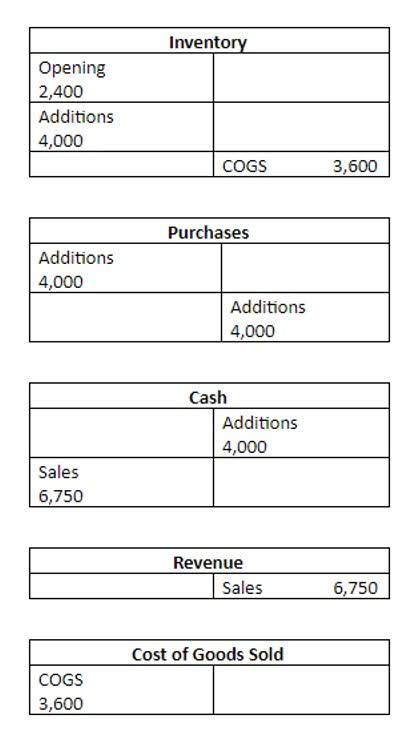
For instance, if an organisation uses AI for its month-end close, the process can be completed in days instead of weeks. Additionally, unearned revenue AI can reduce the risk of errors and fraud by identifying anomalies in the data and raising alerts. These are skills that accountants develop and hone throughout their professional careers. Small companies with less than 500 employees and a turnover of under €100 million or a balance sheet under €86 million can claim SME R&D relief.

Scalability and Flexibility Features in Tech Industry Accounting Software
But at the same time, as always, firms should be careful and deliberate in their technology stack planning. There’s no doubt that technology will continue to drive massive change in the accounting industry in 2024. Accounting professionals who embrace these innovations and adapt their practices accordingly will be well-positioned to succeed in the rapidly shifting landscape. Ng adds that this shift in dynamic—accountants being less involved in more simple accounting tasks—hasn’t eliminated the need for such accounting for tech companies professionals. CPAs and EAs are still invaluable for helping their clients with contentious or complex tax cases and performing other professional engagements, such as an audit, review, or compilation.

Technology Industry Accounting Guide

Investments will still come from friends and former work colleagues, but you may also get funding from angel investors, incubators or accelerators. Here are some technologies that have had a significant impact on the accounting landscape in recent years. | Terms of Use | Privacy Policy | CareersWe improve our products and advertising by using Microsoft Clarity to see how you use our website. By using our site, you agree that we and Microsoft can collect and use this data. Monitoring budget allows startups to identify discrepancies between planned and actual spending. This proactive approach allows them to address problems promptly before they escalate, ensuring the financial stability of the business.
- Accountants use web browsers to access these applications, and all of the data is automatically backed up in the cloud.4 This can also be referred to as cloud computing.
- You can connect with a licensed CPA or EA who can file your business tax returns.
- Additionally, cloud computing can improve collaboration by allowing accounting professionals to make changes to the same document in real-time.
- For competitive growth in the national and global marketplaces, we help institute best-practice financial strategies.
- AI allows accounting professionals to automate a number of tasks, such as data entry and reconciliation.
R&D Tax Credits
Many jurisdictions offer tax credits and incentives for research and development activities, which can significantly reduce tax liabilities for technology companies. Firms should explore available R&D tax credits and consider engaging tax professionals to ensure compliance with international tax laws and manage sales tax and VAT obligations effectively. While accounting is essential, there are strategic ways to manage these expenses.
“I knew I wanted to build something from scratch that could help financial teams and business leaders be more efficient,” Hastings told TechCrunch. In this article, we’ll walk through 11 ways accounting will be affected by technology advancements in 2024. As the industry evolves, it is exciting to be contributing to and helping define this new era of accounting. The accounting profession is well-known for its rigorous expectations and demanding workloads at all job levels. Just say the phrase “busy season” and even a seasoned professional will have a slight feeling of dread. R&D tax relief can give your business some much needed extra support to help through the early bootstrap, pre-seed and seed stages.
Should tax planning be a priority for tech startup founders?
A comprehensive checklist for startup accounting includes accurately recording all financial transactions. This ensures that every accounting transaction is properly accounted for in the general ledger entries of Coffee Shop Accounting a startup. The capitalization and amortization of these expenses pose unique accounting challenges. Understanding these differences is crucial for tech entrepreneurs who aim to navigate their startup’s financial landscape effectively. Tech startups require a different accounting due to several unique characteristics and challenges these companies face.
- By understanding key principles, adhering to financial reporting requirements, and staying informed about tax considerations, tech firms can enhance their financial health and compliance.
- The balance sheet is one of the fundamental financial statements used by law firms to summarize their financial position at …
- The accountant shortage is taking a toll on the millions of small businesses in the United States.
- A good guide to accounting for tech companies can show the best ways to manage money.
- According to Johannes Larsson, CEO of Financer.com, small to medium-sized businesses previously had no choice but to use the services of nearby accountants or have an in-house team of accountants.
- By adhering to these best practices, tech companies can ensure their financial statements are transparent and compliant.
- Tech companies must use the best ERP systems or accounting software and consider accounting best practices to function effectively and avoid common accounting problems.
- Using technologies like encryption, multi-factor authentication, and AI-powered anomaly detection will be essential to ensure data integrity and maintain client trust.
- Client portals are secure websites that allow clients to view their financial statements, invoices, and other related information.
- “You can now manage your accounting from anywhere, at any time, and give access to people all over the world,” Chee adds.
Track expenses related to software, personnel, training, and audits to ensure full compliance with regulations. That’s a vision that has tripped up other startups like Bench, which tried — and failed — to automate some of its expensive human bookkeepers (600 strong at its peak) with AI. But Hastings says Quanta will avoid this conundrum by building an AI-first product before hiring lots of bookkeepers. So naturally, it also only initially accepted customers for which its automated system could perform all of the accounting. AI is embedded in all kinds of software today, non-client facing and otherwise.
Importance of Tracking Research and Development Costs
Accounting is crucial in tech companies, where innovation, high growth, and complex business models are the norm. Precise financial records ensure compliance and help build investor trust and allow companies to make informed decisions about growth, hiring, and future investments. In the fast-paced tech industry, accurate accounting provides a strategic foundation for scalability and agility, enabling firms to adjust to changing market demands without compromising financial stability. Accounting for technology companies involves unique challenges and opportunities. As the tech industry continues to evolve rapidly, companies must adapt their accounting practices to keep pace with innovations and regulatory changes. This article explores the essential aspects of accounting for technology companies, including common accounting practices, financial reporting requirements, and tax considerations.